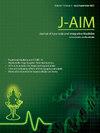开发一种基于阿育吠陀心理健康概念的心理健康筛查工具
IF 1.9
Q3 INTEGRATIVE & COMPLEMENTARY MEDICINE
引用次数: 0
摘要
由于生物调节原理(Dosha)是身体的基本组成部分,三属性(Triguna)-Satva, Raja和Tamas是决定个人精神状态的关键组成部分。虽然基于triguna的心理评估工具是可用的,但没有标准化的工具来评估使用这种独特的阿育吠陀方法的心理健康。因此,这项研究是为了创造一个简单的,自我管理的工具来筛查心理健康基于阿育吠陀的概念- triguna。目的研制一种简单、可靠、有效的基于阿育吠陀经典Triguna概念的心理健康筛查自用药仪。方法在最终发放前,按标准步骤进行量表的编制——概念化、项目生成、项目选择、项目措辞、翻译回译、预试、中试、复试。进行信度和效度检验。可靠性评估包括重测和内部一致性。效度评估包括面、内容、结构、标准和收敛效度。探索性因子分析采用主成分分析和方差旋转进行结构验证和项目缩减。采用分层、多阶段整群抽样技术的横断面研究对400名年龄在20-40岁之间的参与者进行了研究,这些参与者代表了印度喀拉拉邦蒂鲁凡南得普兰邦的农村、城市和沿海地区。根据世卫组织主观幸福感量表(SUBI)评估新开发工具的标准效度。参考标准,评估其诊断特性,包括敏感性、特异性、预测值和似然比,与草案工具一起使用。经过适当的分析,编制了一套38项的自我管理量表,并命名为心理健康评估量表(mahas - tg)。假设验证和结构效度评估采用不同的社区样本,包括来自坎努尔地区不同地理区域的100名个人,来自卡利科特(科日科德)NIT的100名学生和来自坎努尔地区的50名前罪犯。结果新编制的38项Triguna心理健康自评量表(MHAS-TG)具有较高的重测(类内相关系数- 0.8)和内部一致性信度(Cronbach's alpha = 0.9)。该工具具有足够的表面效度和内容效度(内容效度指数- 0.84)。探索性因子分析产生38项9因子解,累积方差为58.06%。评分范围为0-114的自我给药工具根据敏感性和特异性得出了40分和80分的临界值。得分低于40分为心理健康不良,41-80分为心理健康中等,81分以上为心理健康良好。受试者工作特征曲线分析灵敏度为75.36%,特异性为78.18。该工具的平均使用时间为10分钟。对印度喀拉拉邦Thiruvananthapuram地区400人进行心理健康筛查的结果如下:28.25%的人心理健康状况良好,63.5%的人心理健康状况中等,8.5%的人心理健康状况不佳。在坎努尔县进行的再验证表明,17%的人心理健康状况良好,75%的人心理健康状况中等,8%的人心理健康状况较差。在科日科德,16%的人心理健康状况良好,74%的人心理健康状况一般,10%的人心理健康状况较差。在前罪犯中,8%的人心理健康状况良好,67%的人心理健康状况中等,25%的人心理健康状况不佳。独立t检验显示差异有统计学意义(p <;0.05)。弱正相关分析(p <;Satva评分与Rajo Guna评分呈显著负相关(p <;0.01)与Tamo Guna呈正相关(p <;Rajo和Tamo Guna的比值为0.01。结论mhas - tg是一种基于Triguna概念的有效、可靠的38项自我管理工具。该工具具有影响心理健康的风险和保护因素,是一种快速简便的评估心理健康的筛查工具。在Thiruvananthapuram地区的400名参与者中,该工具的管理显示了它识别精神健康状况不佳的人的能力。Satva-Rajo得分之间呈弱正相关,Satva-Tamo得分之间呈强负相关,Rajo-Tamo得分之间呈中度正相关。本文章由计算机程序翻译,如有差异,请以英文原文为准。
Development of an instrument for screening mental health based on Ayurvedic concept of Triguna
Background
As the bio-regulatory principles (Dosha) are the essential components of the body, the three attributes (Triguna)-Satva, Raja, and Tamas are the crucial components of the mind that determine an individual's mental status. Though Triguna-based psychological assessment tools are available, there are no standardized tools to evaluate mental health using this unique Ayurvedic approach.So this research was undertaken to create a simple, self-administering instrument for screening mental health based on Ayurvedic concept-Triguna.
Objective
To develop a simple, reliable, and valid self-administering instrument based on Triguna concept of Ayurvedic classics for screening mental health.
Methods
Standard steps to develop the instrument -Conceptualization, item generation, item selection, item wording, Translation-back translation, pre-test, pilot study, Test-retest were done before the final administration of the draft instrument. Reliability and validity testing were carried out. Reliability assessment included Test-retest and internal consistency. Face, content, construct, criterion and convergent validity were done as part of the validity assessment. Exploratory factor analysis using Principal Component Analysis with Varimax rotation was employed for construct validation and item reduction. A cross-sectional study employing a stratified, multi-stage cluster sampling technique was conducted among 400 participants aged 20–40 years, representing rural, urban and coastal areas of Thiruvananthapuram, Kerala, India. The criterion validity of the newly developed tool was assessed against the WHO Subjective Well-being Inventory(SUBI).The reference standard, evaluated for its diagnostic properties including sensitivity, specificity, predictive values, and likelihood ratios, was administered alongside the draft instrument. After appropriate analyses, a 38-item self-administering instrument was developed and named as Mental Health Assessment Scale with Triguna (MHAS-TG). Hypothesis validation and construct validity were assessed using diverse community samples, comprising 100 individuals from various geographical areas of Kannur District, 100 students from NIT Calicut (Kozhikode) and 50 ex-convicts from Kannur District.
Results
The newly developed 38-item Mental Health self-Assessment Scale with Triguna (MHAS-TG) is presented as a discriminating tool that showed high Test-retest (Intra Class Correlation coefficient - 0.8) and Internal consistency reliability (Cronbach's alpha = 0.9). The tool had adequate face validity and content validity (Content validity index- 0.84). Construct validity by Exploratory factor analysis yielded 38 items of 9-factor solution with a cumulative variance of 58.06 %. The self-administering tool with a score range of 0–114 derived a cut-off score of 40 and 80 based on sensitivity and specificity. The scores below 40 were designated as poor mental health, 41–80 were assigned with moderate mental health, and score above 81 were designated with good mental health. Receiver operating characteristic curve analysis showed a Sensitivity of 75.36 % and a Specificity of 78.18. The average administration time of the tool was 10 min.
Mental health screening of 400 individuals in Thiruvananthapuram district, Kerala, India yielded the following results: 28.25 % exhibited good mental health, 63.5 % had moderate mental health and 8.5 % had poor mental health. Re-validations at Kannur district showed 17 % with good mental health, 75 % with moderate mental health and 8 % with poor mental health. In Kozhikode, 16 % had good mental health, 74 % had moderate mental health and 10 % had poor mental health. In ex-convicts, 8 % had good mental health, 67 % had moderate mental health and 25 % had poor mental health. Independent t-test showed that there was a significant difference (p < 0.05) between the two score values. On analysis a weak positive correlation (p < 0.01) was seen between Satva and Rajo Guna scores, a strong negative correlation (p < 0.01) between Satva and Tamo Guna and a moderate positive correlation (p < 0.01) between Rajo and Tamo Guna.
Conclusion
MHAS-TG is a 38-item tool, valid and reliable self-administering instrument based on Triguna concept. The proposed tool with risk and protective factors affecting mental health is a quick and easy screening tool for assessing mental health.Administration of the tool to 400 participants in Thiruvananthapuram district revealed its ability to identify individuals with poor mental health. The results also showed a weak positive correlation between Satva-Rajo scores, a strong negative correlation between Satva-Tamo scores and a moderate positive correlation between Rajo-Tamo scores.
求助全文
通过发布文献求助,成功后即可免费获取论文全文。
去求助
来源期刊

Journal of Ayurveda and Integrative Medicine
INTEGRATIVE & COMPLEMENTARY MEDICINE-
CiteScore
4.70
自引率
12.50%
发文量
136
审稿时长
30 weeks
 求助内容:
求助内容: 应助结果提醒方式:
应助结果提醒方式:


